Deconstructing Texts: An Analysis of Derrida's Approach to Texts
VerifiedAdded on 2023/06/11
|5
|1055
|124
Essay
AI Summary
This essay delves into Jacques Derrida's deconstructive approach, a cornerstone of postmodern philosophy and post-structuralism. It contrasts deconstruction with structuralism, highlighting Derrida's challenge to the idea of a fixed, univocal meaning within texts. The essay explains the two stages of deconstruction: reversal and neutralization, emphasizing the concept of 'différance,' which underscores the differences and deferral of meaning. It clarifies Derrida's famous statement 'there is no outside-text,' arguing that context is crucial for understanding meaning. The analysis shows how Derrida's approach facilitates a detailed examination of texts, revealing elements that might not be immediately apparent, and it enhances a deeper understanding of philosophical concepts.
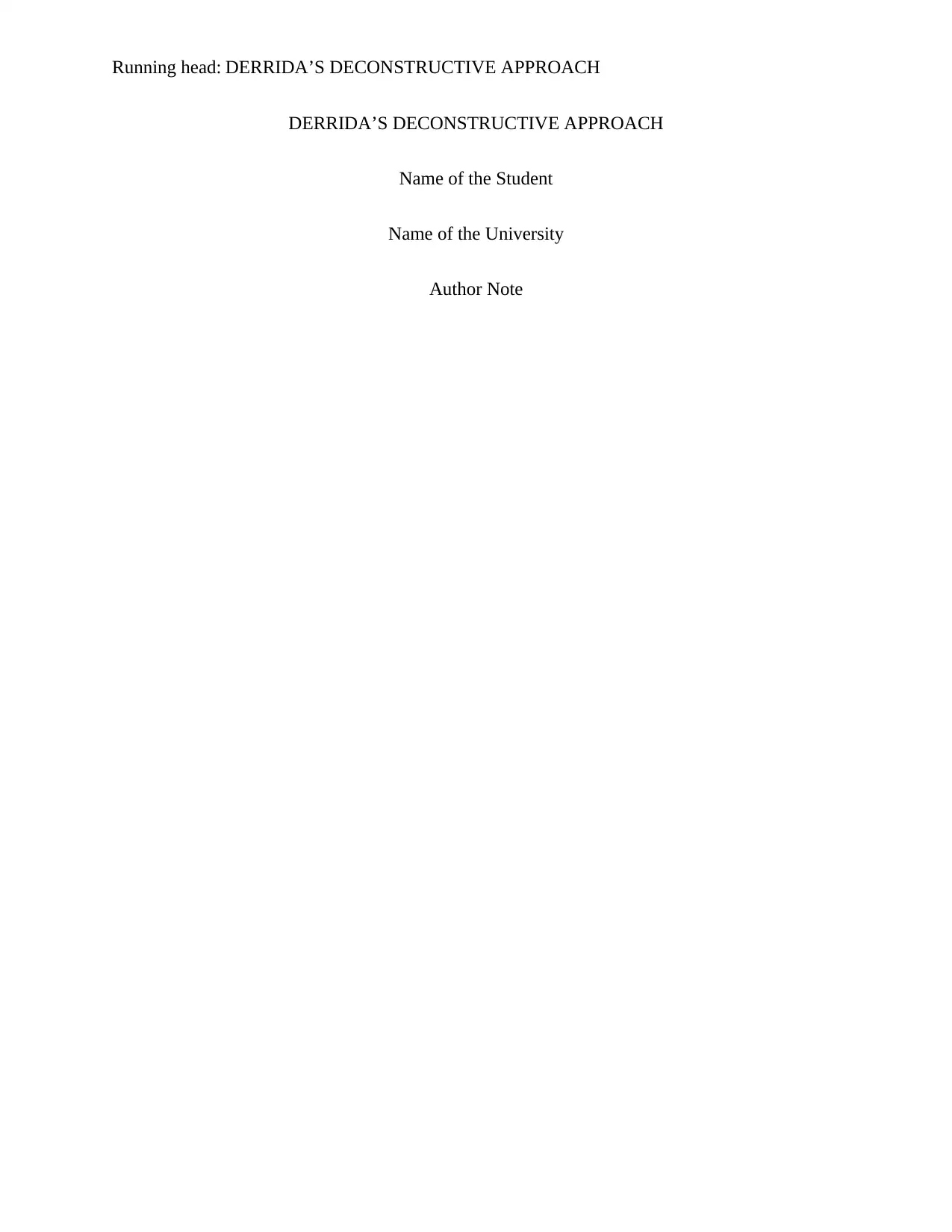
Running head: DERRIDA’S DECONSTRUCTIVE APPROACH
DERRIDA’S DECONSTRUCTIVE APPROACH
Name of the Student
Name of the University
Author Note
DERRIDA’S DECONSTRUCTIVE APPROACH
Name of the Student
Name of the University
Author Note
Paraphrase This Document
Need a fresh take? Get an instant paraphrase of this document with our AI Paraphraser
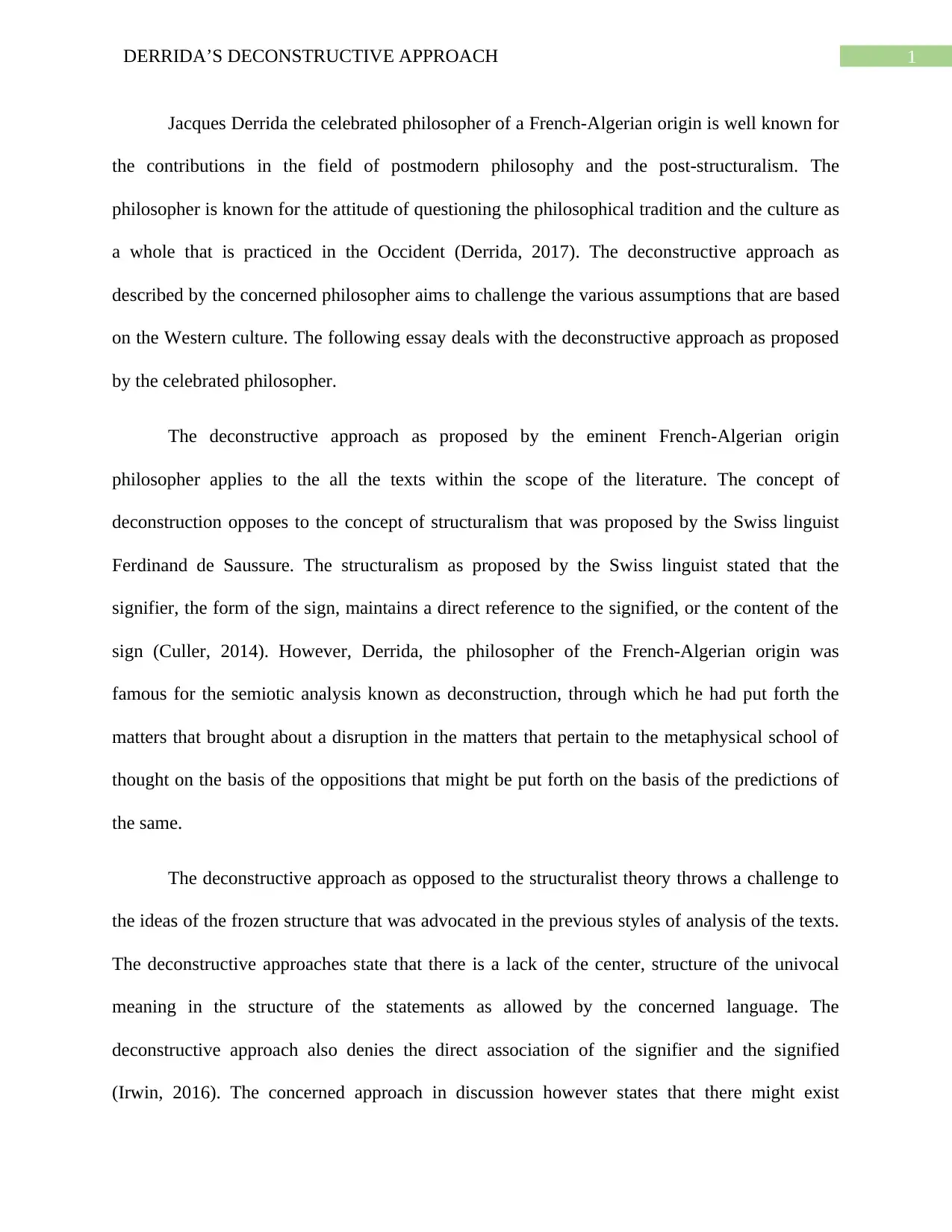
1DERRIDA’S DECONSTRUCTIVE APPROACH
Jacques Derrida the celebrated philosopher of a French-Algerian origin is well known for
the contributions in the field of postmodern philosophy and the post-structuralism. The
philosopher is known for the attitude of questioning the philosophical tradition and the culture as
a whole that is practiced in the Occident (Derrida, 2017). The deconstructive approach as
described by the concerned philosopher aims to challenge the various assumptions that are based
on the Western culture. The following essay deals with the deconstructive approach as proposed
by the celebrated philosopher.
The deconstructive approach as proposed by the eminent French-Algerian origin
philosopher applies to the all the texts within the scope of the literature. The concept of
deconstruction opposes to the concept of structuralism that was proposed by the Swiss linguist
Ferdinand de Saussure. The structuralism as proposed by the Swiss linguist stated that the
signifier, the form of the sign, maintains a direct reference to the signified, or the content of the
sign (Culler, 2014). However, Derrida, the philosopher of the French-Algerian origin was
famous for the semiotic analysis known as deconstruction, through which he had put forth the
matters that brought about a disruption in the matters that pertain to the metaphysical school of
thought on the basis of the oppositions that might be put forth on the basis of the predictions of
the same.
The deconstructive approach as opposed to the structuralist theory throws a challenge to
the ideas of the frozen structure that was advocated in the previous styles of analysis of the texts.
The deconstructive approaches state that there is a lack of the center, structure of the univocal
meaning in the structure of the statements as allowed by the concerned language. The
deconstructive approach also denies the direct association of the signifier and the signified
(Irwin, 2016). The concerned approach in discussion however states that there might exist
Jacques Derrida the celebrated philosopher of a French-Algerian origin is well known for
the contributions in the field of postmodern philosophy and the post-structuralism. The
philosopher is known for the attitude of questioning the philosophical tradition and the culture as
a whole that is practiced in the Occident (Derrida, 2017). The deconstructive approach as
described by the concerned philosopher aims to challenge the various assumptions that are based
on the Western culture. The following essay deals with the deconstructive approach as proposed
by the celebrated philosopher.
The deconstructive approach as proposed by the eminent French-Algerian origin
philosopher applies to the all the texts within the scope of the literature. The concept of
deconstruction opposes to the concept of structuralism that was proposed by the Swiss linguist
Ferdinand de Saussure. The structuralism as proposed by the Swiss linguist stated that the
signifier, the form of the sign, maintains a direct reference to the signified, or the content of the
sign (Culler, 2014). However, Derrida, the philosopher of the French-Algerian origin was
famous for the semiotic analysis known as deconstruction, through which he had put forth the
matters that brought about a disruption in the matters that pertain to the metaphysical school of
thought on the basis of the oppositions that might be put forth on the basis of the predictions of
the same.
The deconstructive approach as opposed to the structuralist theory throws a challenge to
the ideas of the frozen structure that was advocated in the previous styles of analysis of the texts.
The deconstructive approaches state that there is a lack of the center, structure of the univocal
meaning in the structure of the statements as allowed by the concerned language. The
deconstructive approach also denies the direct association of the signifier and the signified
(Irwin, 2016). The concerned approach in discussion however states that there might exist
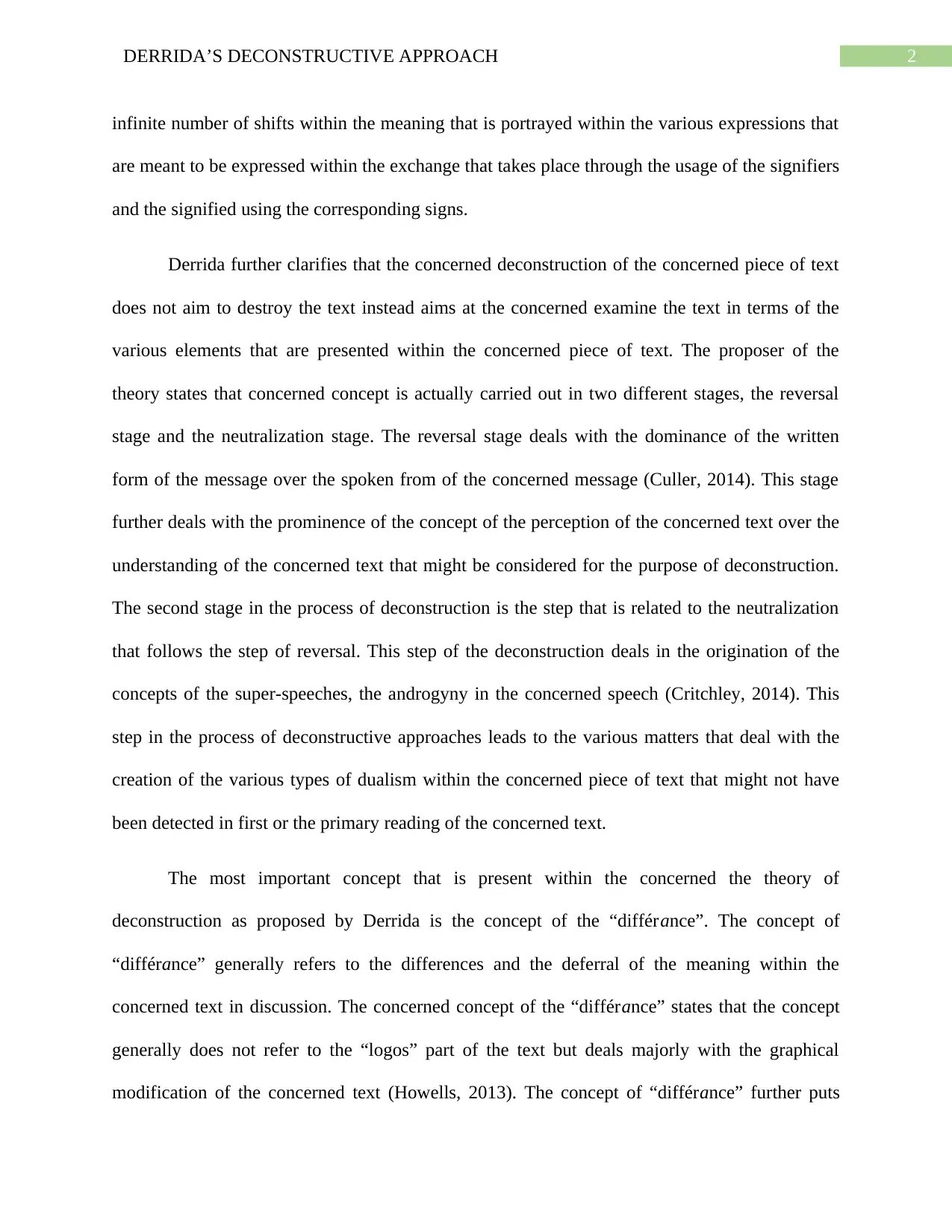
2DERRIDA’S DECONSTRUCTIVE APPROACH
infinite number of shifts within the meaning that is portrayed within the various expressions that
are meant to be expressed within the exchange that takes place through the usage of the signifiers
and the signified using the corresponding signs.
Derrida further clarifies that the concerned deconstruction of the concerned piece of text
does not aim to destroy the text instead aims at the concerned examine the text in terms of the
various elements that are presented within the concerned piece of text. The proposer of the
theory states that concerned concept is actually carried out in two different stages, the reversal
stage and the neutralization stage. The reversal stage deals with the dominance of the written
form of the message over the spoken from of the concerned message (Culler, 2014). This stage
further deals with the prominence of the concept of the perception of the concerned text over the
understanding of the concerned text that might be considered for the purpose of deconstruction.
The second stage in the process of deconstruction is the step that is related to the neutralization
that follows the step of reversal. This step of the deconstruction deals in the origination of the
concepts of the super-speeches, the androgyny in the concerned speech (Critchley, 2014). This
step in the process of deconstructive approaches leads to the various matters that deal with the
creation of the various types of dualism within the concerned piece of text that might not have
been detected in first or the primary reading of the concerned text.
The most important concept that is present within the concerned the theory of
deconstruction as proposed by Derrida is the concept of the “différance”. The concept of
“différance” generally refers to the differences and the deferral of the meaning within the
concerned text in discussion. The concerned concept of the “différance” states that the concept
generally does not refer to the “logos” part of the text but deals majorly with the graphical
modification of the concerned text (Howells, 2013). The concept of “différance” further puts
infinite number of shifts within the meaning that is portrayed within the various expressions that
are meant to be expressed within the exchange that takes place through the usage of the signifiers
and the signified using the corresponding signs.
Derrida further clarifies that the concerned deconstruction of the concerned piece of text
does not aim to destroy the text instead aims at the concerned examine the text in terms of the
various elements that are presented within the concerned piece of text. The proposer of the
theory states that concerned concept is actually carried out in two different stages, the reversal
stage and the neutralization stage. The reversal stage deals with the dominance of the written
form of the message over the spoken from of the concerned message (Culler, 2014). This stage
further deals with the prominence of the concept of the perception of the concerned text over the
understanding of the concerned text that might be considered for the purpose of deconstruction.
The second stage in the process of deconstruction is the step that is related to the neutralization
that follows the step of reversal. This step of the deconstruction deals in the origination of the
concepts of the super-speeches, the androgyny in the concerned speech (Critchley, 2014). This
step in the process of deconstructive approaches leads to the various matters that deal with the
creation of the various types of dualism within the concerned piece of text that might not have
been detected in first or the primary reading of the concerned text.
The most important concept that is present within the concerned the theory of
deconstruction as proposed by Derrida is the concept of the “différance”. The concept of
“différance” generally refers to the differences and the deferral of the meaning within the
concerned text in discussion. The concerned concept of the “différance” states that the concept
generally does not refer to the “logos” part of the text but deals majorly with the graphical
modification of the concerned text (Howells, 2013). The concept of “différance” further puts
⊘ This is a preview!⊘
Do you want full access?
Subscribe today to unlock all pages.

Trusted by 1+ million students worldwide
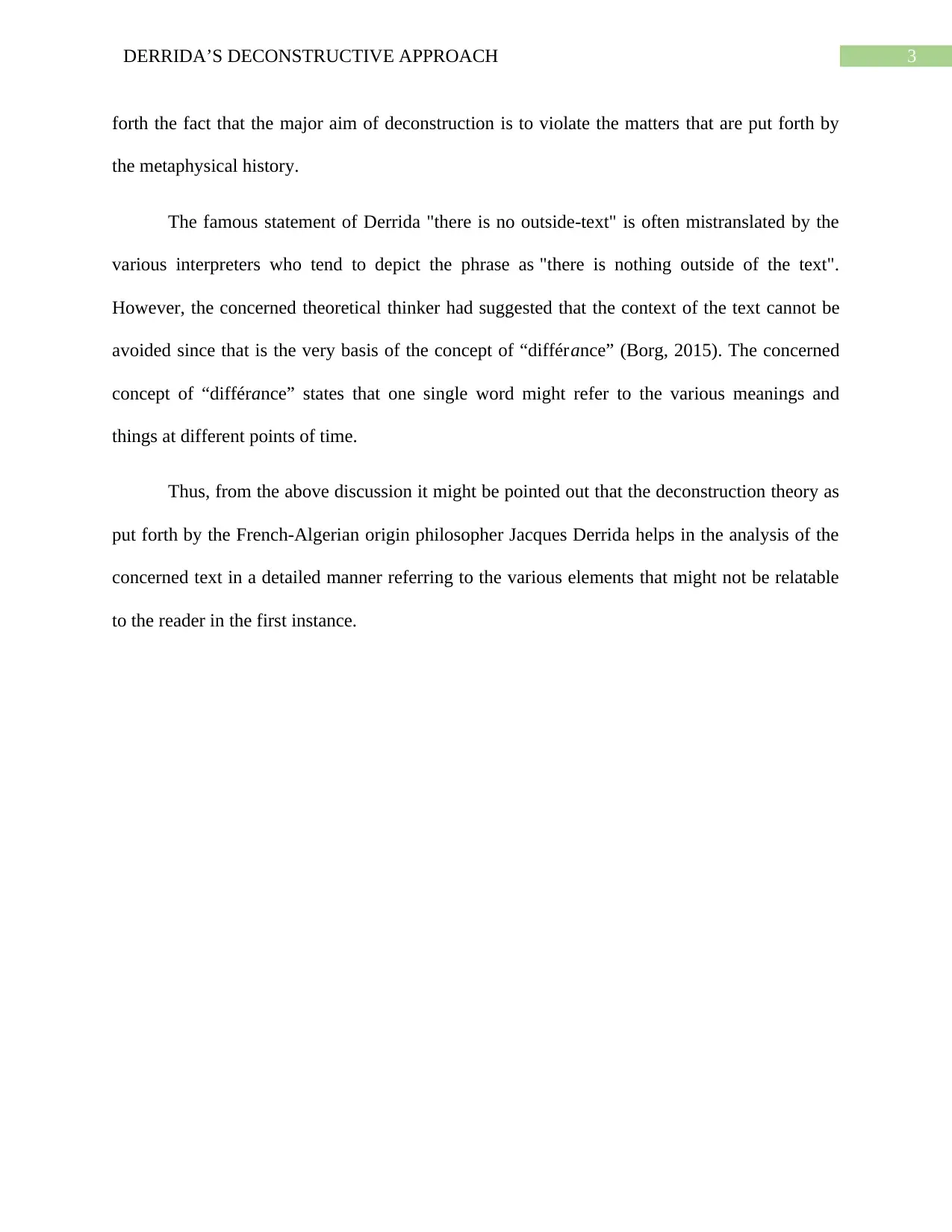
3DERRIDA’S DECONSTRUCTIVE APPROACH
forth the fact that the major aim of deconstruction is to violate the matters that are put forth by
the metaphysical history.
The famous statement of Derrida "there is no outside-text" is often mistranslated by the
various interpreters who tend to depict the phrase as "there is nothing outside of the text".
However, the concerned theoretical thinker had suggested that the context of the text cannot be
avoided since that is the very basis of the concept of “différance” (Borg, 2015). The concerned
concept of “différance” states that one single word might refer to the various meanings and
things at different points of time.
Thus, from the above discussion it might be pointed out that the deconstruction theory as
put forth by the French-Algerian origin philosopher Jacques Derrida helps in the analysis of the
concerned text in a detailed manner referring to the various elements that might not be relatable
to the reader in the first instance.
forth the fact that the major aim of deconstruction is to violate the matters that are put forth by
the metaphysical history.
The famous statement of Derrida "there is no outside-text" is often mistranslated by the
various interpreters who tend to depict the phrase as "there is nothing outside of the text".
However, the concerned theoretical thinker had suggested that the context of the text cannot be
avoided since that is the very basis of the concept of “différance” (Borg, 2015). The concerned
concept of “différance” states that one single word might refer to the various meanings and
things at different points of time.
Thus, from the above discussion it might be pointed out that the deconstruction theory as
put forth by the French-Algerian origin philosopher Jacques Derrida helps in the analysis of the
concerned text in a detailed manner referring to the various elements that might not be relatable
to the reader in the first instance.
Paraphrase This Document
Need a fresh take? Get an instant paraphrase of this document with our AI Paraphraser
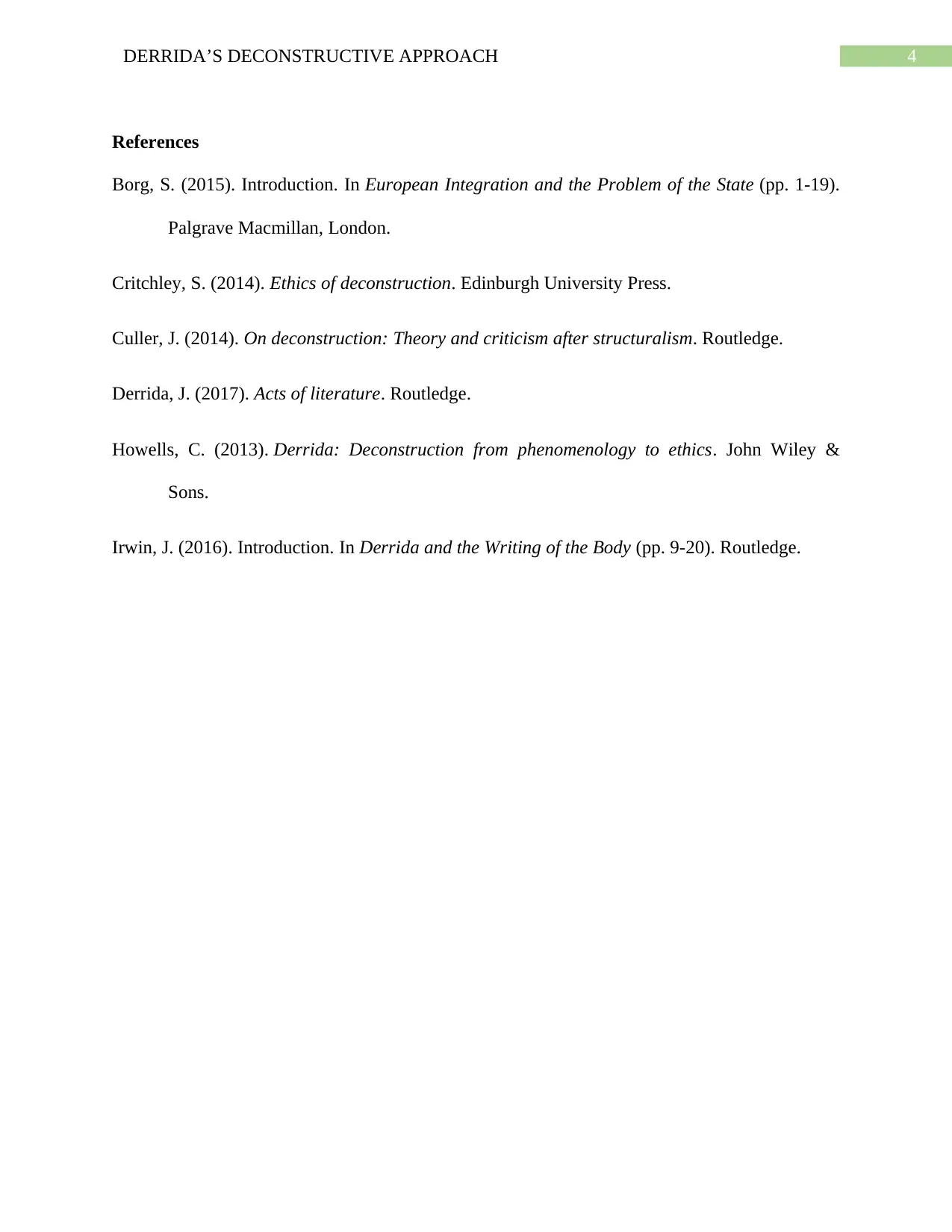
4DERRIDA’S DECONSTRUCTIVE APPROACH
References
Borg, S. (2015). Introduction. In European Integration and the Problem of the State (pp. 1-19).
Palgrave Macmillan, London.
Critchley, S. (2014). Ethics of deconstruction. Edinburgh University Press.
Culler, J. (2014). On deconstruction: Theory and criticism after structuralism. Routledge.
Derrida, J. (2017). Acts of literature. Routledge.
Howells, C. (2013). Derrida: Deconstruction from phenomenology to ethics. John Wiley &
Sons.
Irwin, J. (2016). Introduction. In Derrida and the Writing of the Body (pp. 9-20). Routledge.
References
Borg, S. (2015). Introduction. In European Integration and the Problem of the State (pp. 1-19).
Palgrave Macmillan, London.
Critchley, S. (2014). Ethics of deconstruction. Edinburgh University Press.
Culler, J. (2014). On deconstruction: Theory and criticism after structuralism. Routledge.
Derrida, J. (2017). Acts of literature. Routledge.
Howells, C. (2013). Derrida: Deconstruction from phenomenology to ethics. John Wiley &
Sons.
Irwin, J. (2016). Introduction. In Derrida and the Writing of the Body (pp. 9-20). Routledge.
1 out of 5
Your All-in-One AI-Powered Toolkit for Academic Success.
+13062052269
info@desklib.com
Available 24*7 on WhatsApp / Email
![[object Object]](/_next/static/media/star-bottom.7253800d.svg)
Unlock your academic potential
Copyright © 2020–2026 A2Z Services. All Rights Reserved. Developed and managed by ZUCOL.